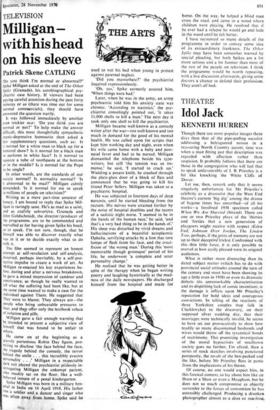TELEVISION
Milligan with his head on his sleeve
Patrick Skene CATLING
'Do you think I'm normal or abnormal?' Spike Milligan asked at the end of The Other Spike (Granada), his autobiographical psy- chiatric case history. If viewers had been paying careful attention during the past forty minutes or so (there was time out for some normal commercials), they should have answered the question warily.
It was followed immediately by another even trickier ()tie: `Do you think you are normal or not?' To help make the answer difficult, this most thoughtfully sympathetic manic-depressive humourist then asked a few supplementary questions, such as: Is it normal for a white man to black up for a minstrel show? Is it normal for a black man to perform in white face? Is it normal to squeeze a tube of toothpaste at the bottom or in the middle? Is it normal for the Pope to be single?
In other words, are the standards of our society normal? Is normality normal? 'Is it abnormal to be mad?' Milligan calmly demanded. 'Is it normal for me to speak to millions of people on television?'
Writing as a mere part-time amateur of lunacy, I am bound to reply that Spike Mil- ligan is ravingly sane. He's as mad as a saint, and as craftily subverkive. Granada and John Goldschmidt, the director/producer of the programme, are to be commended and marvelled at for having given Spike his head, so to speak. I'm not sure, though, that he himself was able to discover exactly what was in it or to decide exactly what to do with it.
The film seemed to represent an honest attempt at self-revelation and self-analysis, distorted, perhaps inevitably, by a self-pro- tective impulse to create a work of art. As Milligan re-enacted his key experiences be- fore, during and after a nervous breakdown, he gave a mixed impression of candour and contrivance, as though he really wanted to tell what the suffering had been like, but at the same time wanted to make a case for the individual against Them. He suggested that They were to blame; They always are—the people who bring unbearable pressures to bear, and the„ ) offer only the textbook solace of isolation and pills. Milligan gave a fair enough warning that he intended to present a subjective view of himself that was bound to be unfair to others.
He came on at the beginning as a gravely portentous Robin Day figure, pro- mising to disclose 'the face behind the face, the tragedy behind the comedy, the terror behind the smile . . . this incredibly evasive Personality . . .' Milligan in a respectable dark suit played the psychiatrist pitilessly in- terrogating Milligan the unkempt patient, who meekly sat on the floor, like a well- behaved inmate of a penal kindergarten.
Spike Milligan was born in a military hos- pital in India on 16 April 1918. His father Was a soldier and a dancer and singer who Was often away from home. Spike said he used to wet his bed when young in protest against paternal neglect.
'Did you masturbate?' the psychiatrist inquired expressionlessly.
'Oh, yes,' Spike earnestly assured him, `When things were bad.'
Later, when he was in the army, an army psychiatrist told him his anxiety state was chronic. 'According to statistics,' the psy- chiatrist consolingly pointed out, 'it takes 11,900 shells to kill a man.' The next day it took only one shell to kill the psychiatrist.
Milligan became well-known as a comedy writer after the war—too well-known and too much in demand for the good of his mental health. He was called upon for scripts that kept him working day and night, even when his wife came home with a baby and post- natal fever and had to be nursed. Milligan dismantled the telephone beside his type- writers, but still 'the tension was so im- mense,' he said, 'I started to crack up.' Wielding a potato knife, he crashed through the plate-glass door of a block of flats and announced that he was going to kill his friend Peter Sellers. Milligan was taken to a psychiatric hospital.
He was subjected to fourteen days of deep narcosis, until he started bleeding from the rectum. His nerves were strained further by the noise of hospital dustbins and the taunts of a sadistic night nurse. 'I seemed to be in the hands of the human race,' he said, 'and that's a very bad thing to be in the hands of.' His sleep was disturbed by vivid dreams and hallucinations of a beautiful ectoplasmic Ophelia, terrifying attacks by a lion that tore lumps of flesh from his face, and the cruci- fixion of 'the wrong man.' During this 'most memorable though grotesque' period of his life, he underwent 'a complete and utter personality change.'
He realised that he was getting better in spite of the therapy when he began writing poetry and laughing hysterically at the mad- ness of the daily newspapers. He discharged himself from the hospital and made for home. On the way, he helped a blind man cross the road, and came to a wood where children were playing. He resolved that if he ever had a relapse he would go and hide in the wood until he felt better.
I have recounted so many details of the programme in order to convey some idea of its extraordinary frankness. The Other Spike may have been somewhat marred by special pleading. but both Spikes are a lot more serious and a lot funnier than most of the rest of the people on television. I think the programme would be worth repeating, with a live discussion afterwards, giving some doctors a chance to defend their profession. They aren't all bad.














































 Previous page
Previous page